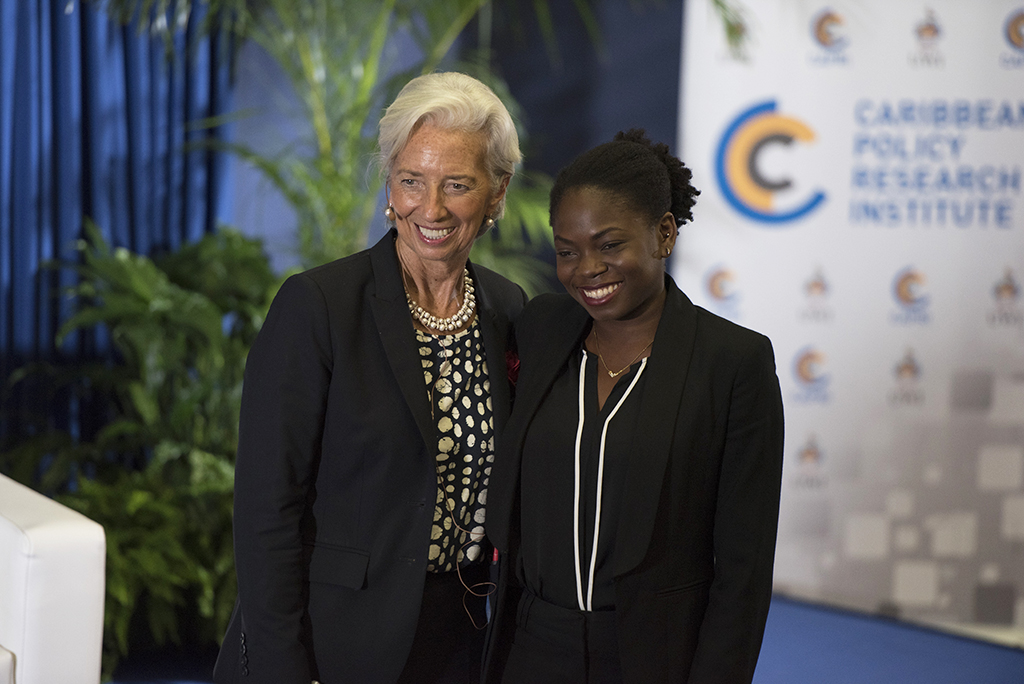IMF Caribbean Essay Contest
Inclusive and Resilient Growth in the Caribbean
October 2-30, 2017
ESSAY WINNERS

IMF Managing Director Christine Lagarde and essay contest winner Kara John from the University of the West Indies, Cave Hill Campus, Barbados (photo: IMF)
First Place: Kara John - read the essay
Second Place: Keenan Falconer - read the essay
Third Place: Wendell Ivey - read the essay
ABOUT THE CONTEST
The International Monetary Fund (IMF) invited students from Caribbean universities and colleges to participate in an essay contest on the topic “Inclusive and Resilient Growth in the Caribbean.” The deadline for submissions was October 30, 2017. Entries were sent by e-mail to: IMFCaribbeanEssay@imf.org.
The essay had to be written in English, by a student currently enrolled at any university or college in the English-speaking Caribbean and Haiti, and be a maximum of 500 words. The essay had to focus on the main challenges to Caribbean growth and how to strengthen resilience.
Essay Guidelines
All essays submitted must respond to three questions:
(i) What, in your opinion, are the three main growth bottlenecks in the Caribbean?
(ii) In what ways could countries in the region strengthen their resilience against external and domestic shocks, taking into account climate change and sometimes fragile macroeconomic stability?
(iii) What can you and your generation do over the course of the next 10 years to improve economic prospects and resilience for the next generation?
Essays should be your original work. The submissions should be written in English, and should not exceed the 500 word limit. In addition, there should be a summary at the beginning, not exceeding 50 words, which will not count towards the 500 word limit. In reviewing entries, the evaluation committee will consider compliance with these requirements, the essay’s relevance to the topic, originality, coherence, structure, and eloquence.
Who Is Eligible?
Students aged 18 to 25 (inclusive), who are nationals from the following countries and territories: Anguilla, Antigua and Barbuda, The Bahamas, Barbados, Belize, Dominica, Grenada, Guyana, Haiti, Jamaica, Montserrat, St. Kitts and Nevis, St. Lucia, St. Vincent and the Grenadines, Suriname, and Trinidad and Tobago. Students must be currently enrolled at any public or private university or college in those countries and territories, in a degree course, short course or extension courses.
Essay Submission Deadline
October 30, 2017 11:59 p.m. (EST)
Prizes
Three finalists were announced in November 2017.
The first-place winner was invited to attend the 2017 High Level Caribbean Forum in Kingston, Jamaica (the IMF covered travel and living expenses for 3 days). The winner will also be given a short paid internship for two months at the IMF local office in Jamaica (additional details will be provided after the winner is announced).
The second- and third-place winners received an iPad and a Fitbit, respectively.
FAQs
The essay contest is intended for young students in university or college. Is there an age limit?
The contest is open to young students, aged 18 to 25 (inclusive).
Can students that have already completed undergraduate programs participate?
Students entering the essay contest must be currently enrolled at a university or college in the Caribbean. Participants must provide their personal details (name, university/educational institution, department/program, age, city, country) at the time they send in their essay.
Can young postgraduate students that are pursuing programs other than master’s degrees, such as short courses and extension courses participate?
Yes, young students who are enrolled in short courses or extension courses may participate in the essay contest.
Is it necessary to attach a certificate of academic attendance?
It is not necessary to submit a certificate of academic attendance; however, you must specify the university and academic program in which you are enrolled. Once a student is selected as a finalist, the evaluation committee will verify the student’s background with the student’s university or college.
I have studied at a Caribbean university, but I am not a Caribbean national. Can I participate?
If a young person is not currently enrolled at any university or college in Anguilla, Antigua and Barbuda, The Bahamas, Barbados, Belize, Dominica, Grenada, Guyana, Haiti, Jamaica, Montserrat, St. Kitts and Nevis, St. Lucia, St. Vincent and the Grenadines, Suriname, and Trinidad and Tobago, he or she may not participate. A student who is not a national from one of the above listed countries and territories may not participate even though he or she is studying in one of those countries or territories.
How can I check to see whether my e-mail arrived? Is there a response time or acknowledgment of receipt?
The IMF will send an e-mail acknowledging receipt to anyone who submits an entry.
Is the correspondence e-mail address case-sensitive (IMFCaribbeanEssay@imf.org)?
The e-mail address is not case-sensitive.
Is there a participation fee to apply for the contest?
There is no participation fee required to participate in the contest.
How will the evaluation committee make its decision?
In reviewing entries, the evaluation committee will consider how well the essay answers the three framing questions, including but not limited to its relevance to the topic, originality, coherence, structure, and eloquence. The evaluation committee may disqualify an entry, for failure to comply with the essay guidelines. The evaluation committee’s decision is final and not subject to appeal. The prize is not transferable or substitutable. No cash payments will be made.
What will the IMF do with my essay?
By entering the competition, you agree that the IMF retains unlimited, non-exclusive right to reproduce your work without further permission. The winning essay and any other essay submitted may, subject to the discretion of the IMF, be published in an academic journal of the University of the West Indies. The IMF may publish the name of competition entrants on its website.



